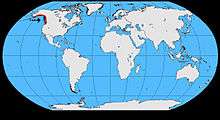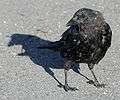Northwestern crow
The northwestern crow (Corvus brachyrhynchos caurinus) is an all-black passerine bird of the crow genus native to the northwest of North America. It is very similar to the more western forms of the widespread American crow (Corvus brachyrhynchos), but it averages slightly smaller (33–41 cm in length) allegedly with proportionately smaller feet and a slightly more slender bill. This taxon is perhaps impossible to identify in the field, and is largely identified by range, though even that method is contested.
| Northwestern crow | |
|---|---|
.jpg) | |
| Scientific classification | |
| Kingdom: | Animalia |
| Phylum: | Chordata |
| Class: | Aves |
| Order: | Passeriformes |
| Family: | Corvidae |
| Genus: | Corvus |
| Species: | C. brachyrhynchos |
| Subspecies: | C. b. caurinus |
| Trinomial name | |
| Corvus brachyrhynchos caurinus Baird, 1858 | |
 | |
| Northwestern crow range | |
Taxonomy
This subspecies was described by Spencer Fullerton Baird in 1858.[2] The American Ornithologists' Union considers it closely related to the American crow and it may be conspecific.[2] Hybrids with American crows have been reported, but not confirmed.[3]
Description
This subspecies' plumage is virtually identical to that of the American crow.[4] Individuals may be distinguished by in-hand criteria such as smaller wing chord and tail length, shorter tarsus, and smaller bill.[3] Identification percentages increase when sex of animal is known.[3] Like the American crow, the sexes look the same.[3] Older birds in breeding condition may be reliably sexed by in-hand criteria such as cloacal protuberance (male) or by brood patch (female).[3] Younger birds may not attain breeding condition as they assist at the nest.[3]
Distribution and habitat
This subspecies occurs in coastal regions and offshore islands of southern Alaska, south through British Columbia to Washington. Beaches and shorelines are the principal forage areas. It can often be seen in and around urban areas.
Behaviour
Diet
Very similar to that of the fish crow; the northwestern crow eats stranded fish, shellfish, crabs and mussels, and also searches through refuse containers for suitable food items. It has been seen to fly into the air with mussels and drop them onto hard surfaces to break them open. It also regularly eats insects, other invertebrates, and various fruits (especially berries). It raids other birds' nests to eat eggs and hatchlings.
Predators
An incomplete list includes cats, raccoons, raptors and ravens. The crows often gather in large groups to mob these predators.
Nesting
Generally solitary, but sometimes built in association with a few other individuals in small, loose colonies in trees or sometimes large bushes. Very rarely, it will nest on cliffs in a recess or even on the ground in a remote area if overhung by a rock for shelter. It is a typical crow nest with 4-5 eggs usually laid.
Voice
The voice is very varied, and many types of call are made, but the most common are usually described as a high pitched "caw" and the sound of a cork coming out of a bottle. A "wok-wok-wok" is given by a bird in flight if straggling behind the group, and various clicks and mechanical sounding rattles are also heard.
Gallery
 A pair of Northwestern crows in Seattle, Washington after foraging.
A pair of Northwestern crows in Seattle, Washington after foraging. Advisory sign during nesting season of Northwestern Crow, Sidney, British Columbia
Advisory sign during nesting season of Northwestern Crow, Sidney, British Columbia Colwood BC
Colwood BC Vancouver, BC
Vancouver, BC Homer, Alaska
Homer, Alaska Seward, Alaska
Seward, Alaska Northwestern crow fledgling
Northwestern crow fledgling.jpg) Steveston, BC
Steveston, BC
References
- BirdLife International (2012). "Corvus caurinus". IUCN Red List of Threatened Species. 2012. Retrieved 26 November 2013.CS1 maint: ref=harv (link)
- American Ornithologists' Union. (1983) Check-list of North American Birds. 7th Edition.
- Pyle, Peter. (1997). Identification Guide to North American Birds
- National Geographic Society. 1983. Field Guide to the birds of North America.
External links
Image links
- Walking on the ground
- Perching on a rail
- Urban bird walking on pavement
- Skull of Northwestern Crow
- Northwestern Crow photo gallery
Sound links
Video links
- Corvus caurinus videos on the Internet Bird Collection
